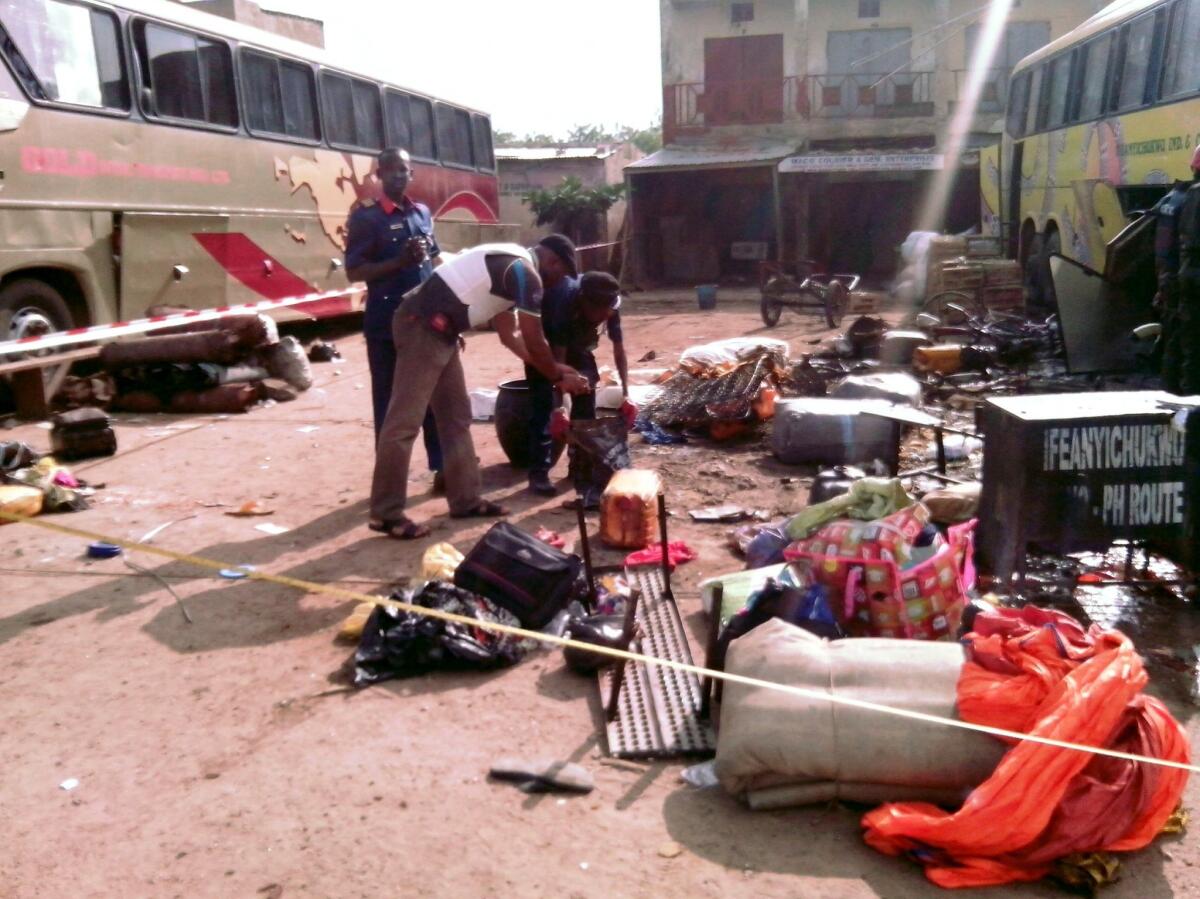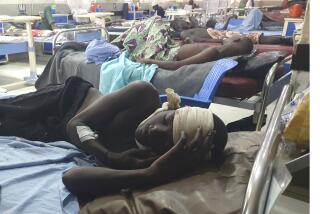Young women used in Nigerian suicide bombings

- Share via
Reporting from Johannesburg, South Africa — Wearing long hijabs, the anonymous women squeeze quietly into crowds, barely noticed.
One slipped in among students gathered Wednesday at a notice board of a college campus in the northern Nigerian city of Kano. She detonated a hidden bomb, killing herself and at least five others, wire services reported.
On Sunday, a 15-year-old female suicide bomber blew herself up near a temporary university site, with no other casualties. Another pushed into a queue of women buying kerosene at a fuel station Monday, detonating a bomb that killed herself and at least three others. Hours later, an 18-year-old woman approached a shopping mall and detonated a bomb. She killed only herself.
No group has claimed responsibility for the rash of daily attacks in Kano, but experts say they bear the marks of the Islamist extremists led by Boko Haram. Police in adjacent Kastina state arrested a 10-year-old girl wearing a suicide vest Tuesday, government spokesman Mike Omeri said Wednesday. Two other Boko Haram suspects were arrested, he said.
Nigerian President Goodluck Jonathan said the use of female suicide bombers was “a new low in the inhuman campaign” of Boko Haram, and was “wicked exploitation” of girls, according to a statement released Monday.
“The president describes as shocking, callous and reprehensible the multiple bomb blasts that occurred in Kano within 24 hours, and the unrelenting attacks by the Boko Haram at a time the Muslim faithful are observing the holy festival of Eid al-Fitr,” ending the holy month of Ramadan, the statement said.
Female suicide bombings have been relatively rare in the insurgency led by Boko Haram, which in April abducted nearly 300 girls from a school outside Chibok town in northeastern Nigeria. Boko Haram has said many of the girls have converted to its violent brand of fundamentalist Islam, raising fears that they have been persuaded to take on the mission of suicide bombers. No such evidence has surfaced, however.
Nigeria’s social media nonetheless have swirled with such fears in recent days.
“Kano again and again. Female suicide bombers again and again – becoming trend. Our #ChibokGirls still in the enemy den. Are we THINKING,” tweeted the leader of a campaign for the girls’ rescue, former Education Minister Oby Ezekwesili, on Tuesday.
“I just pray its not these chibok girl they r forcing into suicide bombing. All bombers were 16 to 17 years,” tweeted Asaba Gamawa with the handle Asaba88. Other Nigerians said the spate of female suicide bombings underscored the need to rescue the Chibok girls, 219 of whom remain with the rebels.
Boko Haram is a fragmented organization, with several splinter groups operating in the north of Nigeria. They are fighting for an Islamic caliphate across Nigeria, a country of 170 million divided between Christians, predominately in the south, and Muslims, predominately in the north.
The group bitterly opposes the Nigerian government and all aspects of Western culture, including secular education, democracy, taxation and banking. It has been known to cut the throats of schoolboys, throw primitive firebombs into locked student dormitories and decapitate its prisoners.
Boko Haram has escalated its attacks this year, targeting rural villages, often randomly shooting residents and launching bomb attacks in crowded urban centers. Thousands have been killed this year alone.
In Kano, a bomb hurled in a church during worship services Sunday killed five. Another bomb exploded last week in a bus station, killing one person. Last month, eight people died in an attack on a Kano university. In May, at least five died in when a bomb exploded in a Christian neighborhood.
The group’s reach and ambition appears to be growing. The group claimed responsibility for a June 25 attack in the crowded port city of Lagos, also carried out by a female suicide bomber. She drove a car next to a tanker parked by a fuel depot and detonated a bomb, killing several people. The attack appeared to be coordinated with a bombing that killed 21 at a shopping mall in the capital, Abuja.
Follow @RobynDixon_LAT for more Africa news
More to Read
Sign up for Essential California
The most important California stories and recommendations in your inbox every morning.
You may occasionally receive promotional content from the Los Angeles Times.












